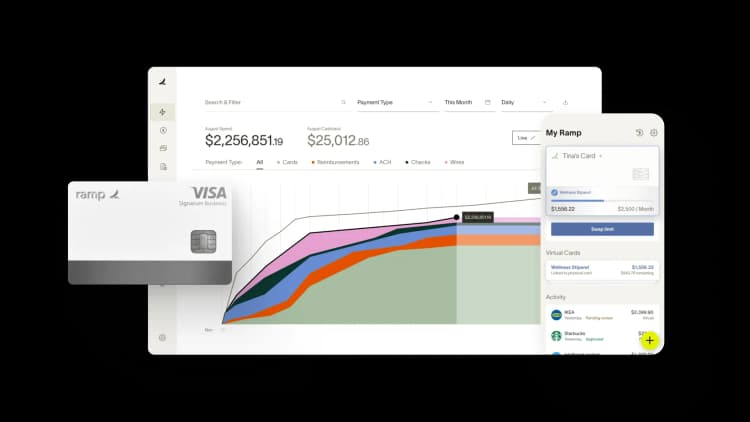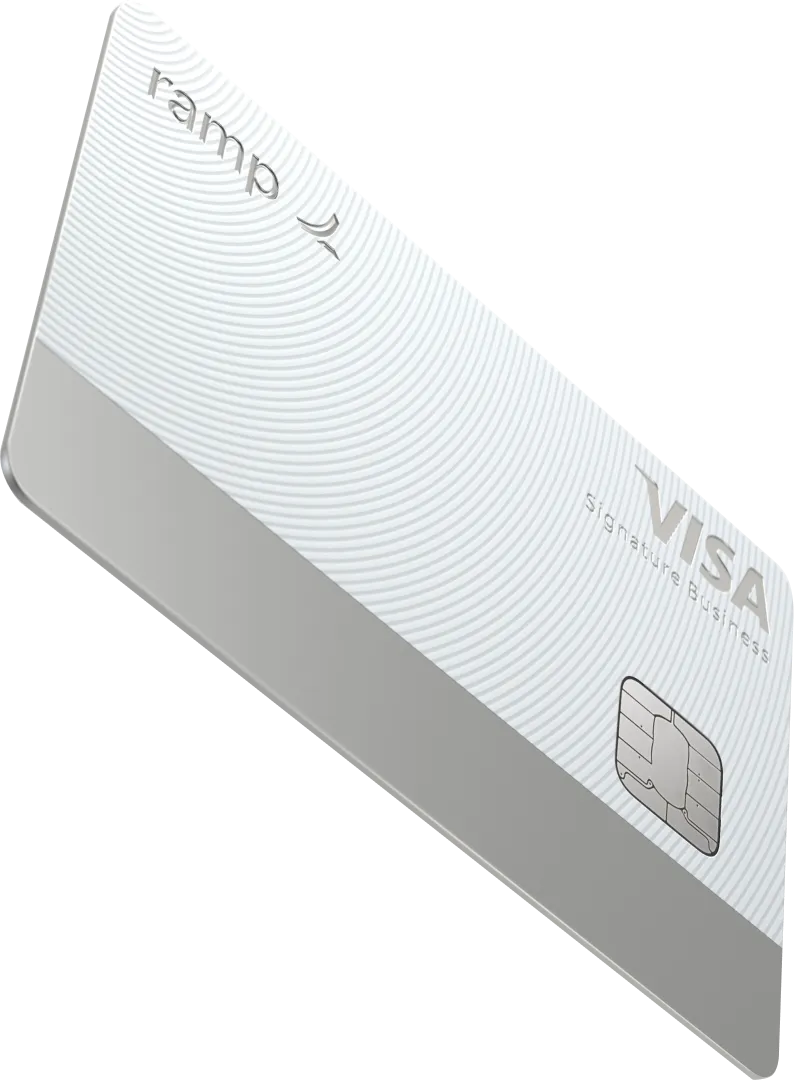How to write a nonprofit credit card policy in 4 steps

- Can a nonprofit organization get a credit card?
- How to write a nonprofit credit card policy
- Do nonprofits pay credit card fees?
- Do nonprofits have credit scores?
- Should a nonprofit get a business credit card?
- Get the Ramp Business Credit Card for your nonprofit

Nonprofits do a lot of good for the world and have several financial protections that other businesses don’t have. These entities have tax exemption status, receive USPS discounts, and can access more grants.
It’s normal for nonprofits to access business grants and loans when they need extra money, but what about credit cards? Discover how nonprofit organization leaders can approach the need for business credit cards.
Can a nonprofit organization get a credit card?
Luckily, nonprofit organizations can get business credit cards. These cards let nonprofits access additional capital, and many financial institutions offering these cards also offer auto-generated reports.
A business credit card can help nonprofit organizations with tax planning, and these cards also come with great perks. You can get cashback or points on every purchase that can further support your nonprofit’s mission.
How to write a nonprofit credit card policy
Every business needs a credit card policy. This set of rules can prevent credit card misuse and detect illegitimate purchases before they become more common. These are some of the components to keep in mind when crafting a nonprofit credit card policy.
1. Define unauthorized actions
Nonprofit organizations should establish which types of actions are not allowed under the credit card policy. For instance, you shouldn’t allow employees to use your business credit card for a cash advance or for personal purchases. The policy should also mention that any refunds get processed as credit instead of cash.
2. Set spending limits
Employees shouldn’t have the ability to splurge with their business credit cards. You can use built-in controls to limit the size of a card’s balance at any given point. You can set different spending limits for different types of employees. Some workers have more financial responsibilities than others and should have their limits adjusted accordingly.
3. Establish who receives a business credit card
Not everyone in a nonprofit organization needs a business credit card. You should determine which levels of seniority should have access to a credit card. These controls can reduce the likelihood of unauthorized spending.
4. Have employees agree to the terms
A nonprofit credit card policy should indicate the consequences of breaching the contract. One instance of unauthorized spending may result in a fine, while accumulating several violations can possibly result in termination. Before giving out business credit cards, have your employees sign a contract so you have it on paper.
Discover Ramp's corporate card for modern finance

Do nonprofits pay credit card fees?
Nonprofit organizations still have to pay credit card fees. Some cards charge an annual fee while others have other costs like foreign transaction fees and cash advance fees.
Looking for a business credit card with little to no fees can help nonprofits save money. However, there are tradeoffs. Most credit cards with no annual fees tend to have few perks beyond basic rewards programs. These cards are optimal for people who want to keep things simple. Depending on how your organization spends its money, a rewards credit card may justify the annual fee.
Do nonprofits have credit scores?
Nonprofit companies have credit scores just like any other business. 501(c)3 charity organizations can improve their credit scores with on-time credit card payments and responsible usage. A company’s credit score will go up if they practice good financial habits and stay on top of debt payments.
Under the FICO Small Business Scoring Service, each company has a business credit score ranging from 0 to 300. A higher credit score will help you qualify for more loans and get better financing.
You can typically get 7(a) SBA loans with a 140 FICO SBSS score, but some banks may only work with you if you have a 160 score. Intelliscore Plus from Experian and Dun & Bradstreet have credit score ranges from 0-100. Each of these scoring models rewards business owners with higher scores.
Should a nonprofit get a business credit card?
A business credit card gives charity organizations extra cash that they can tap into at any time. Extra cash makes it easier to buy supplies, retain talented workers, and spread your nonprofit’s mission. A business credit card can also improve your nonprofit’s credit score. A higher credit score will make it easier to qualify for business financing, and you'll also get better rates and terms.
Business credit cards also come with a range of additional perks. Most cards come with rewards programs that can add up, fraud protection, auto-generated spending reports, and other perks. You can also assign corporate business credit cards for each employee and set spending limits to ensure your team uses your cards responsibly. Business credit cards can help 501(c)3 charity organizations stay on top of their finances.
Nonprofit owners can use their personal credit scores to get financing, but they will find more opportunities with business financing. Small business lenders usually have more capital available than personal loan providers.
What are nonprofits allowed to spend money on?
Nonprofits can spend money on resources and initiatives that support their charitable purpose. Nonprofits have to pay salaries based on market value, invest in advertising and fundraising efforts, and incur operating costs. They must spend more money on program-related activities than administrative costs. They're also allowed to donate to charities.
Get the Ramp Business Credit Card for your nonprofit
Ramp helps small businesses and nonprofits streamline their expense management and lets you give business credit cards to your workers. You can give out corporate business credit cards without any additional costs while saving an average of 5% through Ramp's expense-reducing features.
Ramp’s business credit cards don't come with any interest or annual fees. Plus, you may be eligible for a higher credit limit than with a traditional credit card. Nonprofit owners also won’t have to worry about any foreign transaction fees. You can review auto-generated reports of card transactions and set spending limits for each employee’s card.

Don't miss these
“Ramp gives us one structured intake, one set of guardrails, and clean data end‑to‑end— that’s how we save 20 hours/month and buy back days at close.”
David Eckstein
CFO, Vanta

“Ramp is the only vendor that can service all of our employees across the globe in one unified system. They handle multiple currencies seamlessly, integrate with all of our accounting systems, and thanks to their customizable card and policy controls, we're compliant worldwide. ”
Brandon Zell
Chief Accounting Officer, Notion

“When our teams need something, they usually need it right away. The more time we can save doing all those tedious tasks, the more time we can dedicate to supporting our student-athletes.”
Sarah Harris
Secretary, The University of Tennessee Athletics Foundation, Inc.

“Ramp had everything we were looking for, and even things we weren't looking for. The policy aspects, that's something I never even dreamed of that a purchasing card program could handle.”
Doug Volesky
Director of Finance, City of Mount Vernon

“Switching from Brex to Ramp wasn't just a platform swap—it was a strategic upgrade that aligned with our mission to be agile, efficient, and financially savvy.”
Lily Liu
CEO, Piñata

“With Ramp, everything lives in one place. You can click into a vendor and see every transaction, invoice, and contract. That didn't exist in Zip. It's made approvals much faster because decision-makers aren't chasing down information—they have it all at their fingertips.”
Ryan Williams
Manager, Contract and Vendor Management, Advisor360°

“The ability to create flexible parameters, such as allowing bookings up to 25% above market rate, has been really good for us. Plus, having all the information within the same platform is really valuable.”
Caroline Hill
Assistant Controller, Sana Benefits

“More vendors are allowing for discounts now, because they're seeing the quick payment. That started with Ramp—getting everyone paid on time. We'll get a 1-2% discount for paying early. That doesn't sound like a lot, but when you're dealing with hundreds of millions of dollars, it does add up.”
James Hardy
CFO, SAM Construction Group






